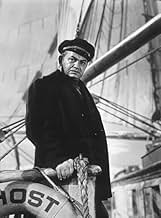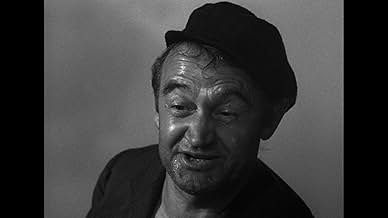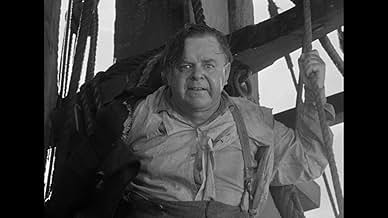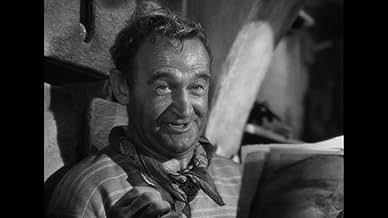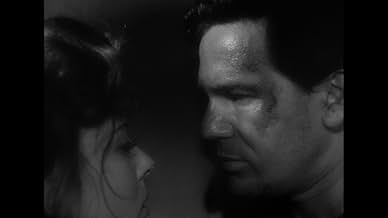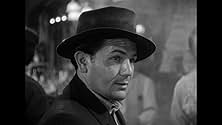IMDb रेटिंग
7.5/10
4.8 हज़ार
आपकी रेटिंग
अपनी भाषा में प्लॉट जोड़ेंAfter being fished out of the sea by a sailing ship, three fugitives find themselves prisoners of the ship's brutal skipper who refuses to put them ashore, and they hatch an escape plan duri... सभी पढ़ेंAfter being fished out of the sea by a sailing ship, three fugitives find themselves prisoners of the ship's brutal skipper who refuses to put them ashore, and they hatch an escape plan during a crew mutiny.After being fished out of the sea by a sailing ship, three fugitives find themselves prisoners of the ship's brutal skipper who refuses to put them ashore, and they hatch an escape plan during a crew mutiny.
- 1 ऑस्कर के लिए नामांकित
- 2 कुल नामांकन
Ernie Adams
- Pickpocket
- (बिना क्रेडिट के)
Cliff Clark
- First Detective
- (बिना क्रेडिट के)
Jeane Cowan
- Singer
- (बिना क्रेडिट के)
Richard Cramer
- Bartender
- (बिना क्रेडिट के)
William Gould
- Second Detective
- (बिना क्रेडिट के)
Ralf Harolde
- Agent Getting Johnson Shanghaied
- (बिना क्रेडिट के)
Oscar 'Dutch' Hendrian
- Crewman
- (बिना क्रेडिट के)
फ़ीचर्ड समीक्षाएं
"I've spit in the eye of better men than you for saying less", boatswain John Garfield snarls at sadistic captain Edward G. Robinson in this gritty film noir, set in the open sea, but fenced in, very noir-like, by constant dense fog.
I believe Raoul Walsh would have made a more dynamic film over Jack London's novel than Michael Curtiz did, but it is still a pretty good watch any day of the week. Robert Rossen wrote the screenplay which is well-structured, but far too literal and talkative for the pacing of a dramatic work of art. The lighting of the set, basically just the ship 'The Ghost', is brilliant, Erich Wolfgang Korngold's score must count among his best, highly effective and evocative.
Acting is on a very high level, with Robinson grabbing a first prize for his portrayal of the complex sadist 'Wolf' Larson. John Garfield is his swarthy and sexy adversary, and Barry Fitzgerald turns his signature role of the Irish leprechaun on its head with his vicious, diabolical snitch of a sailor, truly scary, a virtuoso performance.
I believe Raoul Walsh would have made a more dynamic film over Jack London's novel than Michael Curtiz did, but it is still a pretty good watch any day of the week. Robert Rossen wrote the screenplay which is well-structured, but far too literal and talkative for the pacing of a dramatic work of art. The lighting of the set, basically just the ship 'The Ghost', is brilliant, Erich Wolfgang Korngold's score must count among his best, highly effective and evocative.
Acting is on a very high level, with Robinson grabbing a first prize for his portrayal of the complex sadist 'Wolf' Larson. John Garfield is his swarthy and sexy adversary, and Barry Fitzgerald turns his signature role of the Irish leprechaun on its head with his vicious, diabolical snitch of a sailor, truly scary, a virtuoso performance.
Jack London's novels usually dealt with the interrelationship between man and nature. Herbert Spencer had corrupted and popularized the theories of Charles Darwin as "the survival of the fittest," something Darwin never wrote and wouldn't have believed anyway. In London's best works Spencer's jargon is not promoted but rather utilized to discredit the doctrine which was being bastardized by the robber barons in the pre-Great Depression world of big business to justify their millions of largely untaxed loot. Not surprisingly London was a socialist. Power hungry, egotistical humans are depicted as animals whose characteristics they share. Wolf Larsen is not unlike a wolf who stalks his prey to devour it one piece at a time.
Though there are significant differences between the novel and the movie, "The Sea Wolf" remains true to form. London would have undoubtedly approved of the film version of perhaps his best work. Wolf Larsen who identifies with the master poet John Milton not just because Milton went blind in a similar way that Larsen was going blind but also because Satan in the serpent as described by Milton in "Paradise Lost" believes many notions that Larsen believes. That he underlines the famous passage, "Better to reign in Hell, than serve in Heaven" is indicative of how Larsen views himself.
The consummate actor Edward G. Robinson, who could play any role as if he were that particular character, breathes life into this very complex personality. Obviously Larsen has a conscience and is not totally corrupt and evil. During the famous, telling scene when Dr. Louis "Louie" J. Prescott played to perfection by Gene Lockhart is kicked down the stairs by Larsen just after the sea wolf has told the crew not to pick on him anymore, the viewer can tell by the look in Larsen's eyes and the expression on his face that he has a degree of remorse for what happens next. Satan in the serpent would not possess any remorse. The true embodiment of evil is the Igor-type creature everyone calls Cooky (Barry Fitzgerald, playing against type and giving perhaps the best performance of his career). Full of hate, insidiously mocking his crew mates and anyone else with whom he makes contact, this vile little man shows no redeeming qualities whatsoever. In some ways Larsen is actually jealous of Cooky for being more iniquitous than himself, hence why Larsen turns on him.
A major weakness is the somewhat frivolous romance between George Leach (John Garfield) and Ruth Brewster (Ida Lupino). Both fugitives, it is quite understandable how the two are attracted to each other but that the two would become so close so soon is highly unlikely. Garfield and the multi-talented Lupino were two of the best Thespians of their generation so expect standout performances by each.
A somewhat wild card in the acting department is Alexander Knox as the sensitive writer Humphrey Van Weyden. Later Knox would receive accolades playing President Woodrow Wilson. He does so well in this film the viewer wonders what would have happened had Knox not become overly identified as Wilson to the extent that he never again got a suitable role for his talents. London obviously split his personality when he wrote himself into "The Sea Wolf." His literary side is represented by Humphrey, his adventurous romantic side by Leach.
Though there are significant differences between the novel and the movie, "The Sea Wolf" remains true to form. London would have undoubtedly approved of the film version of perhaps his best work. Wolf Larsen who identifies with the master poet John Milton not just because Milton went blind in a similar way that Larsen was going blind but also because Satan in the serpent as described by Milton in "Paradise Lost" believes many notions that Larsen believes. That he underlines the famous passage, "Better to reign in Hell, than serve in Heaven" is indicative of how Larsen views himself.
The consummate actor Edward G. Robinson, who could play any role as if he were that particular character, breathes life into this very complex personality. Obviously Larsen has a conscience and is not totally corrupt and evil. During the famous, telling scene when Dr. Louis "Louie" J. Prescott played to perfection by Gene Lockhart is kicked down the stairs by Larsen just after the sea wolf has told the crew not to pick on him anymore, the viewer can tell by the look in Larsen's eyes and the expression on his face that he has a degree of remorse for what happens next. Satan in the serpent would not possess any remorse. The true embodiment of evil is the Igor-type creature everyone calls Cooky (Barry Fitzgerald, playing against type and giving perhaps the best performance of his career). Full of hate, insidiously mocking his crew mates and anyone else with whom he makes contact, this vile little man shows no redeeming qualities whatsoever. In some ways Larsen is actually jealous of Cooky for being more iniquitous than himself, hence why Larsen turns on him.
A major weakness is the somewhat frivolous romance between George Leach (John Garfield) and Ruth Brewster (Ida Lupino). Both fugitives, it is quite understandable how the two are attracted to each other but that the two would become so close so soon is highly unlikely. Garfield and the multi-talented Lupino were two of the best Thespians of their generation so expect standout performances by each.
A somewhat wild card in the acting department is Alexander Knox as the sensitive writer Humphrey Van Weyden. Later Knox would receive accolades playing President Woodrow Wilson. He does so well in this film the viewer wonders what would have happened had Knox not become overly identified as Wilson to the extent that he never again got a suitable role for his talents. London obviously split his personality when he wrote himself into "The Sea Wolf." His literary side is represented by Humphrey, his adventurous romantic side by Leach.
Jack London's novel "The Sea Wolf" is one of those old chestnuts that seemingly won't go away. It has served as an subject for movies almost since they began being made, including Italian and Russian versions. This 1941 Warner version remains the definitive screen adaptation, however, in spite of numerous alterations to the plot of the original novel.
In the book, Wolf Larson is a giant Norwegian sea captain who rules his ship by virtue of his strength and brutality. He is the embodiment of the old joke which runs: "Yea though I walk through the valley of the shadow of death I shall fear no evil, because I am the meanest, toughest son of a b--- in the valley!" One would ordinarily think that the five foot six inches tall Edward G. Robinson would be a poor choice to play such a character. However, Robinson is a good enough actor, and a forceful enough screen personality, to carry it off.
John Garfield is equally perfect as a chip-on-the-shoulder working class seaman who dares to oppose Larson. He's a perfect foil for Robinson, and it's great fun watching the two of them snarl at each other like a couple of wild dogs.
Ida Lupino and Alexander Knox do some of their best work as the two castaways rescued by Larson's vessel. Lupino plays a female ex-convict trying to conceal her past, and Knox is an effete writer whom Larson decides to educate in what he considers the ways of the real world.
Gene Lockhart and Barry Fitzgerald are equally good in supporting roles as the ship's drunken and degraded doctor, and the thoroughly corrupt cook. It is particularly refreshing to see Fitzgerald play a really unpleasant character for a change, and one can only wonder why he didn't get more parts like this. In The Sea Wolf, Fitzgerald plays an individual so slimy that one almost expects to see him leave a trail behind him, like a slug.
Director Michael Curtiz managed to impart a dank and foggy atmosphere to The Sea Wolf that seems to suit the story perfectly, and that feeling is enhanced by Erich Korngold's moody score. The first view of the schooner "Ghost", looming out of the fog like a real ghost, is particularly memorable.
Granted, the ending differs radically from that of the book. This film's ending seems rather more satisfying than London's was, however. London was virtually forced to end the novel the way he did because it is presented in narrative form and the writer, Van Wyden, is the one actually telling the story. Warner Brothers could change the ending because, as a movie, the story was no longer restricted to Van Wyden's point of view.
In the book, Wolf Larson is a giant Norwegian sea captain who rules his ship by virtue of his strength and brutality. He is the embodiment of the old joke which runs: "Yea though I walk through the valley of the shadow of death I shall fear no evil, because I am the meanest, toughest son of a b--- in the valley!" One would ordinarily think that the five foot six inches tall Edward G. Robinson would be a poor choice to play such a character. However, Robinson is a good enough actor, and a forceful enough screen personality, to carry it off.
John Garfield is equally perfect as a chip-on-the-shoulder working class seaman who dares to oppose Larson. He's a perfect foil for Robinson, and it's great fun watching the two of them snarl at each other like a couple of wild dogs.
Ida Lupino and Alexander Knox do some of their best work as the two castaways rescued by Larson's vessel. Lupino plays a female ex-convict trying to conceal her past, and Knox is an effete writer whom Larson decides to educate in what he considers the ways of the real world.
Gene Lockhart and Barry Fitzgerald are equally good in supporting roles as the ship's drunken and degraded doctor, and the thoroughly corrupt cook. It is particularly refreshing to see Fitzgerald play a really unpleasant character for a change, and one can only wonder why he didn't get more parts like this. In The Sea Wolf, Fitzgerald plays an individual so slimy that one almost expects to see him leave a trail behind him, like a slug.
Director Michael Curtiz managed to impart a dank and foggy atmosphere to The Sea Wolf that seems to suit the story perfectly, and that feeling is enhanced by Erich Korngold's moody score. The first view of the schooner "Ghost", looming out of the fog like a real ghost, is particularly memorable.
Granted, the ending differs radically from that of the book. This film's ending seems rather more satisfying than London's was, however. London was virtually forced to end the novel the way he did because it is presented in narrative form and the writer, Van Wyden, is the one actually telling the story. Warner Brothers could change the ending because, as a movie, the story was no longer restricted to Van Wyden's point of view.
Edward G. Robinson puts his own brand of cruelty on the role of a freighter captain who tyrannizes his crew and some unexpected passengers (Ida Lupino, John Garfield, Alexander Knox) in this taut, suspenseful psychological melodrama with no shortage of brooding atmosphere.
Based on the famous Jack London story of Wolf Larsen (Robinson), the callous and inhuman skipper of a schooner, who proceeds to make life hell for his crew and his unwilling passengers rescued from a sinking ferryboat. Lupino and Garfield are a couple of losers with a past; Knox is a mild-mannered novelist. The romantic angle between Garfield and Ida is underplayed with the accent more on the brooding tension aboard the schooner.
Under Michael Curtiz' direction, all the performances are first-rate and Erich Wolfgang Korngold's intriguing score helps sustain the tense mood of passengers adrift on a fog-shrouded sea. Alexander Knox's restrained portrayal of an intellectual is a perfect foil for Robinson's bombastic megalomaniac skipper. Stand-outs in the large supporting cast are Gene Lockhart as a nervous, cowardly doctor and Barry Fitzgerald as a crafty cook, a sinister departure from his usual comic roles.
Absorbing all the way, well worth viewing, this represented a step up the ladder for Ida Lupino's career at Warner Bros. Watch for my full-length career article on Ida Lupino scheduled to appear in an upcoming issue of FILMS OF THE GOLDEN AGE.
Based on the famous Jack London story of Wolf Larsen (Robinson), the callous and inhuman skipper of a schooner, who proceeds to make life hell for his crew and his unwilling passengers rescued from a sinking ferryboat. Lupino and Garfield are a couple of losers with a past; Knox is a mild-mannered novelist. The romantic angle between Garfield and Ida is underplayed with the accent more on the brooding tension aboard the schooner.
Under Michael Curtiz' direction, all the performances are first-rate and Erich Wolfgang Korngold's intriguing score helps sustain the tense mood of passengers adrift on a fog-shrouded sea. Alexander Knox's restrained portrayal of an intellectual is a perfect foil for Robinson's bombastic megalomaniac skipper. Stand-outs in the large supporting cast are Gene Lockhart as a nervous, cowardly doctor and Barry Fitzgerald as a crafty cook, a sinister departure from his usual comic roles.
Absorbing all the way, well worth viewing, this represented a step up the ladder for Ida Lupino's career at Warner Bros. Watch for my full-length career article on Ida Lupino scheduled to appear in an upcoming issue of FILMS OF THE GOLDEN AGE.
One of the great classics Directed by the gifted tyrant Micheal Curtiz. Every performance is excellent with Edward G. giving one of his best. Curtiz did not make boring films, this speeds along at under 90 minutes without a dull moment. The miniature work is even good, note the scene near the beginning with the row boat in the bay. That is a miniature in a tank but pretty damn convincing. Flawless and gripping.
क्या आपको पता है
- ट्रिवियाThe first movie to have its world premiere on a ship: the luxury liner "America", during a trip from San Francisco to Los Angeles.
- गूफ़Until the era of the 1st World War, the practice on board a ship was to call orders for the helmsman to move the tiller either to port or to starboard. Calling "hard a-port" meant moving the tiller to port, which means the rudder and the vessel, will then move to starboard. With wheel steering, putting the helm/tiller to port, means spinning the wheel to starboard. Ships no longer use this system - these days helm directions refer to the desired turn of the rudder/vessel. The James Cameron movie "Titanic" also contained a similar scene, which generated a lot of puzzlement. It IS a bit confusing at first, unless one is a sailor and is familiar with tiller steering.
- भाव
Humphrey Van Weyden: There's a price no man will pay for living.
- इसके अलावा अन्य वर्जनThe film was cut by approximately 12 minutes down to less than 90 minutes for re-issue. The deleted footage consisted of little, but integral, moments throughout the story which added considerably to the quality of the film as a whole. For many years, the only known existing print of the original 99-minute theatrical version was a 16mm print which belonged to the film's star, John Garfield. However, Warner Brothers studio recently discovered a 35mm print of this original version at the Museum of Modern Art in New York City. It was subsequently restored and used for distribution on DVD and Blu Ray.
- कनेक्शनEdited into The Sea Wolf (1993)
- साउंडट्रैकHello! Ma Baby
(uncredited)
Music by Joseph E. Howard
Lyrics by Ida Emerson
Played on piano and sung by Jeane Cowan in the bar
टॉप पसंद
रेटिंग देने के लिए साइन-इन करें और वैयक्तिकृत सुझावों के लिए वॉचलिस्ट करें
विवरण
- रिलीज़ की तारीख़
- कंट्री ऑफ़ ओरिजिन
- भाषा
- इस रूप में भी जाना जाता है
- Der Seewolf
- फ़िल्माने की जगहें
- उत्पादन कंपनी
- IMDbPro पर और कंपनी क्रेडिट देखें
बॉक्स ऑफ़िस
- बजट
- $10,13,217(अनुमानित)
- दुनिया भर में सकल
- $6,192
- चलने की अवधि1 घंटा 40 मिनट
- रंग
- पक्ष अनुपात
- 1.37 : 1
इस पेज में योगदान दें
किसी बदलाव का सुझाव दें या अनुपलब्ध कॉन्टेंट जोड़ें


